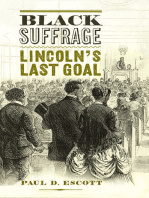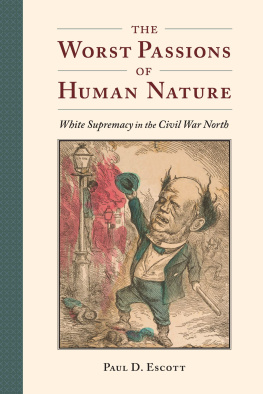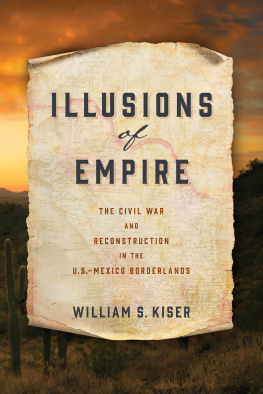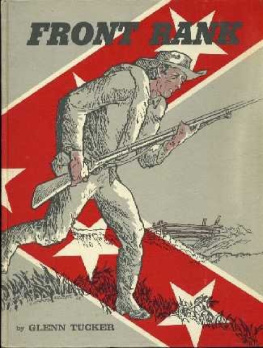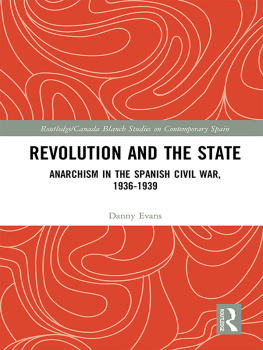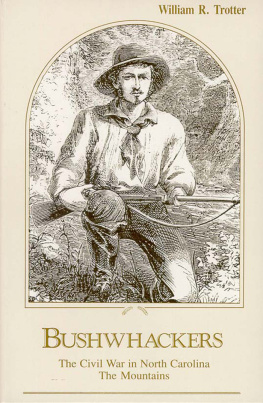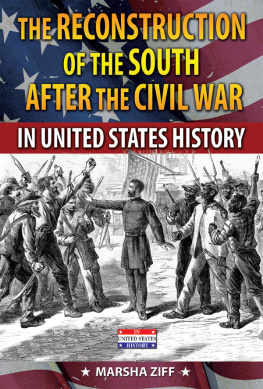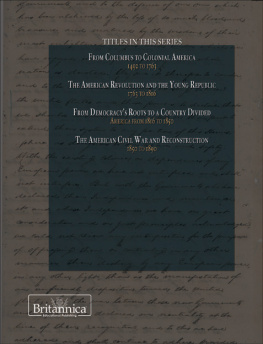North Caroliniansin the Era of theCivil War & Reconstruction
2008
The University of North Carolina Press
All rights reserved
Manufactured in the United States of America
Designed by Eric M. Brooks
Typeset in Monticello and Clarendon by Tseng
Information Systems, Inc.
Laura F. Edwardss essay in this book is a revised version of Laura F. Edwards, Status without Rights: African Americans and the Tangled History of Law and Governance in the Nineteenth-Century U.S. South, American Historical Review 112, no. 2 (April 2007): 36593; reprinted with permission.
The paper in this book meets the guidelines for permanence and durability of the Committee on Production Guidelines for Book Longevity of the Council on Library Resources.
The University of North Carolina Press has been a member of the Green Press Initiative since 2003.
Library of Congress Cataloging-in-Publication Data
North Carolinians in the era of the Civil War and
Reconstruction / edited by Paul D. Escott.
p. cm.
Includes bibliographical references and index.
ISBN 978-0-8078-3222-6 (cloth : alk. paper)
ISBN 978-0-8078-5901-8 (pbk. : alk. paper)
1. North CarolinaHistoryCivil War, 18611865.
2. North CarolinaPolitics and government1861
1865. 3. North CarolinaHistory1865 4. North
CarolinaPolitics and government18651950.
5. Reconstruction (U.S. history, 18651877)
North Carolina. 6. African AmericansNorth
CarolinaSocial conditions19th century. 7. African
AmericansSegregationNorth CarolinaHistory
19th century. 8. WomenNorth CarolinaSocial
conditions19th century. 9. North Carolina
Biography. I. Escott, Paul D., 1947
E524.N67 2008
973.7456dc22 2008005592
cloth 12 11 10 09 08 5 4 3 2 1
paper 12 11 10 09 08 5 4 3 2 1
Contents
North Caroliniansin the Era of theCivil War & Reconstruction
Introduction
The era of the Civil War and Reconstruction was a crucial period in U.S. history and in the history of North Carolina. More was at stake than the fate of the Union and the future of slavery, vitally important though these questions were. The fundamental character of southern societyits dominant values as well as its race relations, class relations, and gender relationsalso was in flux as impersonal forces and human efforts created enormous pressures for change. In North Carolina, people at all levels of society reacted swiftly to events. Some seized their opportunity to promote long-desired alterations in the social structure, while others fought back, working to block or negate change. These struggles ultimately shaped the states politics and its social landscape for decades to come.
Throughout the South, both the war and Reconstruction shook the foundations of the social structure. Wars privations and disruptions brought conflicts to the surface, challenging conventions and empowering groups that had been without influence, and from the start Reconstruction was a battleground over the future of social relations. To the extent that fundamental change became a reality, that fact in turn stimulated efforts at profound resistance. Thus, it is no mystery why this period remains a crucial and fascinating one for historical investigation. The era attracts many of the best minds in the profession and constantly inspires innovative, original scholarship.
In studies of the Civil War and Reconstruction, North Carolina attracts more than its share of attention and is the focus of a great deal of exciting new scholarship. One reason for this phenomenon is the fact that events in the Tar Heel State revealed with special clarity the basic conflicts that dominated both eras. Whether the topic is emancipation and race relations; class conflict or white solidarity; the status, rights, and roles of women; or the struggles in society to mold an ideological consensus, North Carolinas history throws a revealing light on vital social processes. The struggles over change were especially visible, and often very bitter, in the Tar Heel State.
During the Civil War, North Carolina became an unexpectedly important source of strength for the new southern nation, supplying one-sixth of the Confederacys soldiers and nearly one-fourth of all its conscripts. Forty thousand soldiers from North Carolina died, fully a third of all those from the state who served in the army. Although Federal forces captured Roanoke Island and nearby coastal regions, most of the state remained under southern control and thus furnished to the Confederacy an uninterrupted stream of tax revenues, food from the tax-in-kind, and impressed commodities of all sorts.
But along with these enormous contributions of men and matriel came strong protests from the stateagainst conscription, impressments, suspension of the writ of habeas corpus, and other policiesas well as large-scale desertion of troops and internal class divisions on the home front. Thus, North Carolinians did much to sustain the Confederacy, but at the same time they exhibited a great deal of disaffection. Slaves in the eastern part of the state ran away to gain their freedom, while some white Tar Heels aided the Union, tried to find neutral ground, or joined a rising chorus of complaints from the war-weary. Despite the states immense contributions to the southern war effort, by 1864 many observers questioned whether there was enough loyalty in North Carolina to hold it within the Confederacy until the end of the conflict.
The key issues of Reconstruction also developed and played out in a dramatic way in the Tar Heel State. During Reconstruction, established leaders resisted congressional Reconstruction, while newly enfranchised African Americans joined with a substantial number of white citizens, particularly in the piedmont, to form a strong Republican Party. But despite the biracial cooperation within the states Republican Partyor because of itNorth Carolina became the site of a large amount of Ku Klux Klan terrorism and violence. North Carolinas women sought new influence, some acting within a patriarchal context while others struggled to expand the boundaries of gender roles. Sharp differences of class interest contended with pressures for white racial solidarity. The nature of social relations would affect not just Reconstruction but the New South, in which North Carolina would soon become both a leader of industry and a center of the farmers' Populist revolt.
These dramatic and important events are a magnet for historical talent, attracting ambitious scholars who want to test their understanding of key issues and build new theories on the data of North Carolinas past. Award-winning scholars and talented newcomers are focusing on North Carolina in order to understand the Confederacys life and death, the realities of emancipation, the struggles for and against a more democratic, liberated society during Reconstruction, and the agonized birth of the New South. What were the sources of change, and who were its agents? Who orchestrated resistance to change, and what were their weapons? This volume brings together some of the most valuable new scholarship on a vitally important period and an unusually revealing state. Nine new and original essays shed light on emancipation, loyalty and conflict among white Confederates, challenges to racial and sexual mores, the uses of racism by key politicians, the sources of change in womens social position, and the contest to develop a historical consciousness and social ideology that would shape the future. They also remind us that the world of these North Carolinians, in contrast to our own, was intensely local. Many Tar Heel citizens were protective of their homes and their state, and they viewed regional or national issues through a North Carolina lens that gave a distinctive character to their perspective on southern culture.


